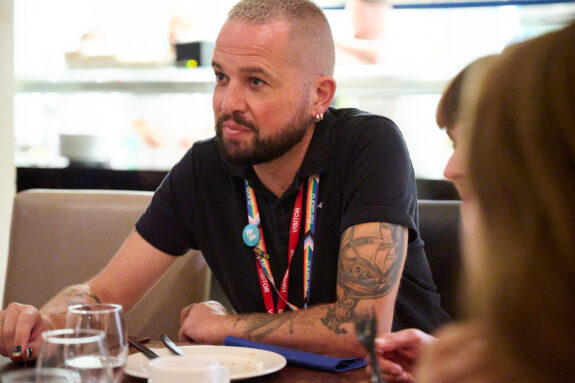12 Oct 2023
Darren Lacey, Forward's Inclusion Co-ordinator, LGBTQ+ Lead and Drug and Alcohol Practitioner, talks about his experiences of coming out.

For me, ‘coming out’ was a bit of an anti-climax. I was living in Glasgow at the time and I phoned home to friends back home in Kent and said “I’ve started seeing someone”, everyone replied “Oh, cool. What’s her name? What’s she like?” I said “His name is Steve” (not his real name), and the responses I got were so casual, like “Excellent! What’s he like, then?”
Growing up in the 80/90s where there was a lot of homophobia and acceptance of gay people was limited, I expected the response to my coming out to be one of shock or even disgust. But it wasn’t. I had rehearsed this scenario in my head countless times and, as a chronic overthinker, built it up in my head as headline news. Truth was, most people already ‘knew’, or at least assumed, I was gay.
Oddly, I’ve never ‘come out’ to my family – it just is. I come from a large family and tried to hide my sexuality but in actual fact, everyone kinda knew.
A mistake many people outside of the LGBTQ+ community make, is that people think you just come out once. This isn’t the case for a lot of us. It can seem like you come out on a daily basis. From going to work, in the supermarket, at the GP surgery, at a friend’s birthday party. Heteronormative assumptions can sometimes make it a bit of a chore, having to explain you don’t have wife, but do have a husband or vice versa. Or that you are single at the moment and interested in both men and women. It can, sometimes, feel like you judge a room before deciding how much of yourself you can be, how much you let people into your life. But, I can tell you, it does get easier and your self-confidence, self-acceptance and “proud-ness” gets a boost every time.
I dream of the day when “coming out” isn’t even a thing. When we are all accepted for who we are, by everyone. Until that time comes, if someone discloses to you that they are LGBTQ+, don’t make a big deal. Don’t gasp in shock. Just a simple “thanks for sharing that with me” or “I really appreciate you telling me. Is there anything more I can do to support?”